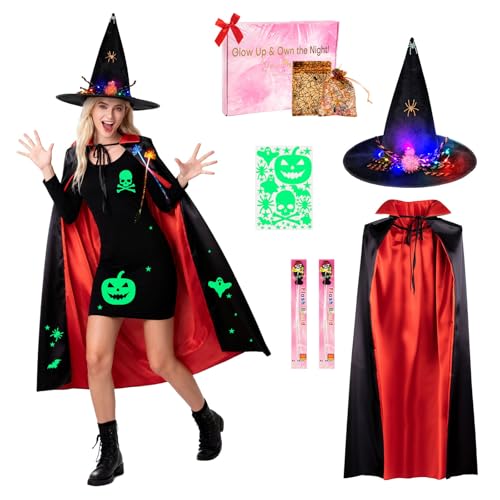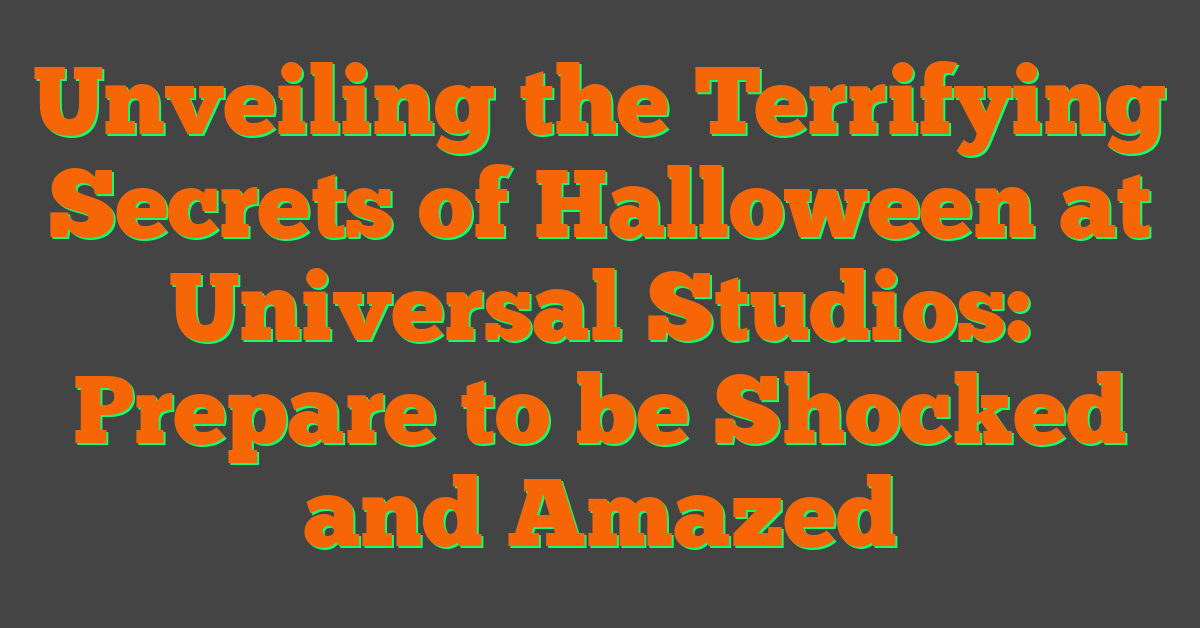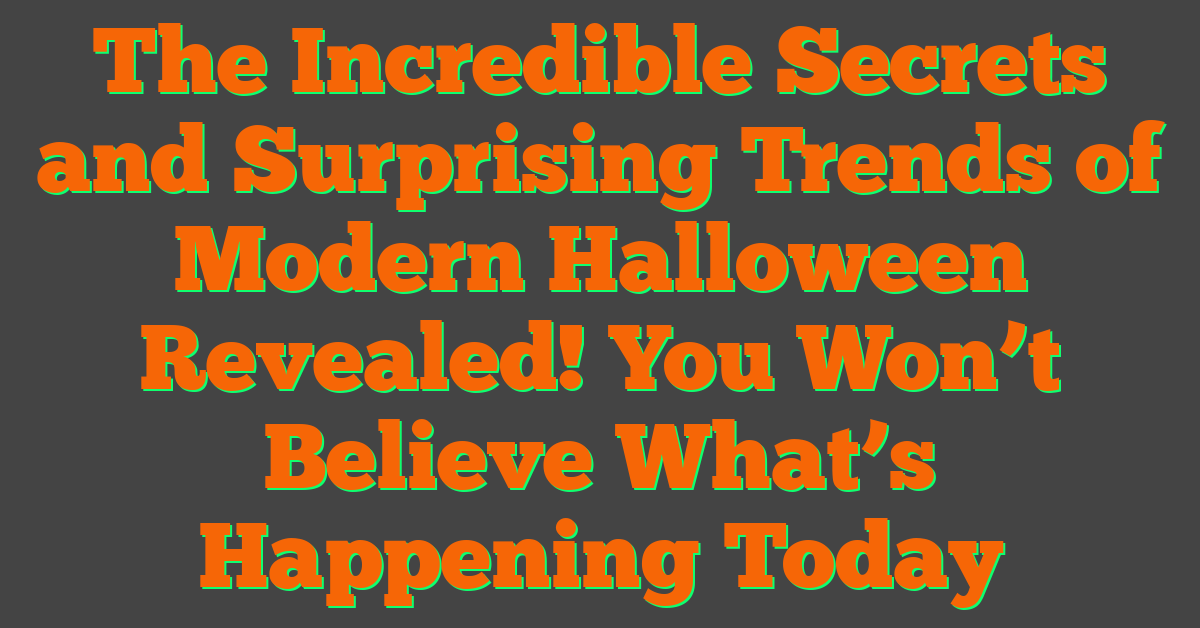Halloween is a widely celebrated holiday that brings out the spooky and festive spirit in many people. But have you ever wondered if it is in line with biblical teachings? In this article, we will explore the question of whether Halloween is unbiblical and delve into the different perspectives surrounding this topic. So, if you’ve ever pondered the spiritual implications of this holiday, keep reading to gain a better understanding of the debate.
As Christians, it’s important to examine our beliefs and ensure they align with our faith. And that includes questioning the traditions we partake in, such as Halloween. In this article, we will take a closer look at the origins of Halloween and how it has evolved over time. By understanding its historical context, we can better evaluate whether Halloween contradicts biblical principles and decide how we want to engage with this holiday.
Halloween is a time when costumes, candy, and spooky decorations take center stage. But for some Christians, there may be concerns about the spiritual implications of participating in this holiday. In this article, we will explore the different viewpoints within the Christian community regarding Halloween. By examining the arguments for and against Halloween’s compatibility with biblical teachings, we can gain a deeper insight into this ongoing debate.
Origins of Halloween
You might be wondering how Halloween came to be. Let’s take a trip back in time and explore the fascinating origins of this spooktacular holiday.
Historically, Halloween can be traced back to the ancient Celtic festival of Samhain (pronounced SOW-in). This festival marked the end of the harvest season and the beginning of winter. The Celts believed that on the night of Samhain, the line between the living and the dead blurred, allowing spirits to roam the earth.
Fun fact: The name “Halloween” is a contraction of “All Hallows’ Eve,” referring to the night before All Hallows’ Day (or All Saints’ Day) which falls on November 1st.
As centuries passed, Halloween evolved and assimilated various customs from different cultures. One significant influence came from Christian traditions. In the 8th century, Pope Gregory III designated November 1st as All Saints’ Day, and the previous night became known as All Hallows’ Eve, eventually morphing into Halloween.
Did you know? Trick-or-treating has its roots in the ancient practice of leaving food and offerings outside one’s house to appease wandering spirits. This tradition evolved into people going from door to door, asking for treats.
Today, Halloween has become a beloved holiday that brings people of all ages together for a night of spooky fun. As a Halloween enthusiast myself, I’ve seen firsthand how it ignites creativity and imagination.
Pro tip: If you’re looking to make your Halloween experience truly unforgettable, consider visiting your local Halloween shops. They offer an incredible variety of costumes, decorations, and accessories to take your celebration to the next level.
Remember, the origins of Halloween may be rooted in ancient traditions, but the way we celebrate it today is up to us. Whether you choose to embrace the spooky elements or focus on the community aspect, Halloween offers something special for everyone.
Halloween and the Bible
As a Halloween enthusiast named Ricky, you know that Halloween is a holiday deeply rooted in ancient traditions and customs. However, you also understand that some people may have concerns about the compatibility of Halloween with their religious beliefs, particularly when it comes to the Bible.
While there isn’t a specific mention of Halloween in the Bible, it is important to recognize that Halloween has evolved over time and its current form is a blend of various traditions from different cultures. As such, the religious significance of Halloween can vary depending on individual interpretations.
For many Halloween enthusiasts, the holiday is seen as a time to embrace the fun and spooky elements, dressing up in costumes and enjoying decorations and activities. It’s an opportunity to let your imagination run wild and connect with the playful and adventurous side of yourself.
It’s worth noting that Halloween does have connections to Christian traditions. The holiday falls on the day before All Saints’ Day, a Christian observance honoring all saints and martyrs. In some Christian denominations, including Catholicism, All Saints’ Day is a time to remember and pray for those who have passed away.
For those who view Halloween through a religious lens, it can be a time to reflect on themes such as life and death, good and evil, and the ultimate triumph of light over darkness. It can serve as a reminder of the eternal hope and victory found in their faith.
Ultimately, whether or not you choose to celebrate Halloween in a religious context is a personal decision. As with any holiday, it’s important to approach it with mindfulness and respect for your own beliefs and the beliefs of others.
Pagan Origins of Halloween
One aspect that adds to the allure of Halloween is its rich history and pagan origins. So let’s dive into the fascinating roots of this spooktacular holiday.
History Lesson: Halloween has its origins in the ancient Celtic festival of Samhain, which marked the end of the harvest season and the beginning of winter. The Celts believed that on the night of October 31st, the boundary between the living and the dead was blurred. They lit bonfires and wore costumes to ward off roaming spirits.
Influence of Roman Traditions: When the Romans conquered the Celtic territories, they incorporated some of their own traditions into Samhain. For instance, they celebrated Feralia, a day to honor the dead, and Pomona, the goddess of fruit and trees. These Roman customs mingled with the Celtic practices, giving birth to a unique celebration.
Christian Influence: As Christianity spread throughout Europe, efforts were made to incorporate pagan holidays into the Christian calendar. In the 7th century, Pope Boniface IV established All Saints’ Day on November 1st to honor all martyrs and saints. The evening before, known as All Hallows’ Eve, gradually became Halloween.
Blending of Traditions: Over time, Halloween evolved into a fusion of pagan, Roman, and Christian traditions. This melding allowed people to celebrate the changing seasons, honor the deceased, and pay tribute to saints, all in one festivity.
From Ancient Origins to Modern Practices: Today, Halloween is celebrated with costume parties, trick-or-treating, haunted houses, and pumpkin carving. While some may focus on the spooky elements, it’s important to remember the historical and cultural significance of this holiday.
Christian Perspectives on Halloween
As a Halloween enthusiast, you may wonder how this festive holiday aligns with Christian beliefs. Let’s explore some Christian perspectives on Halloween and how they can help you navigate this spooky season.
- Maintaining the Meaning: Some Christians choose to embrace Halloween while keeping its historical and cultural meaning in mind. They view it as an opportunity to connect with their communities, share their faith, and spread love and light amidst the darkness. By focusing on the positive aspects of Halloween, these individuals aim to honor their beliefs while enjoying the festivities.
- Redeeming the Darkness: Others believe that Christians can use Halloween as an opportunity to “redeem” the darkness associated with the holiday. For them, it’s a chance to address spiritual themes, such as the reality of evil and the triumph of light over darkness. By hosting alternative events like fall festivals or Bible-based costume contests, they hope to turn Halloween into a teaching moment and use it as a platform to share their faith.
- Considering Cultural Traditions: Some Christians may choose to participate in Halloween activities while being mindful of their cultural and personal beliefs. They acknowledge that Halloween has evolved over time, incorporating both pagan and Christian elements, and they navigate its celebrations by focusing on values such as community, creativity, and fun. These individuals may choose to skip certain aspects, like witchcraft or occult themes, while embracing the more light-hearted and family-friendly side of Halloween.
It’s important to note that while different Christian perspectives exist, ultimately, your own beliefs and convictions should guide your choices during Halloween. Whether you fully embrace the holiday, seek to redeem it, or approach it with caution, the key is to remain true to your faith and use Halloween as an opportunity to grow in your relationship with God and connect with others.
Addressing concerns about Halloween
As a Halloween enthusiast, you may encounter concerns and criticisms about the holiday. It’s important to address these matters and understand different perspectives. Here are a few common concerns and some insights to help you navigate the debate:
1. Is Halloween a pagan holiday?
Some argue that Halloween has pagan origins and should not be celebrated by Christians. While it’s true that Halloween has roots in ancient Celtic traditions, it has evolved over time and has become a blend of various cultural and religious influences. For many people today, Halloween is more about dressing up in fun costumes, enjoying spooky decorations, and connecting with friends and family.
2. Does celebrating Halloween promote darkness?
Another concern centers around the themes of darkness and fear associated with Halloween. However, it’s important to remember that Halloween is predominantly about embracing the joy of imagination and creativity. It’s an opportunity to indulge in harmless scares and have a good time. Ultimately, it’s up to you to determine how you want to celebrate the holiday and ensure it aligns with your personal values.
3. Should Christians participate in Halloween?
There is a range of opinions within the Christian community about Halloween. Some Christians choose to abstain from the holiday altogether, while others see it as an opportunity to engage with their community and share Christ’s love. Ultimately, it’s a matter of personal conviction and understanding the significance of Halloween to you.
4. How can you make Halloween meaningful?
If you’re looking to infuse a deeper meaning into your Halloween celebrations, consider incorporating elements that align with your faith. You can organize fall festivals, community events, or even host a trunk-or-treat gathering at your church. Engaging in acts of service or using Halloween as an opportunity to reach out to others can help make the holiday more meaningful for you.
Conclusion
By examining the origins of Halloween and its connection to the Bible, you have gained a deeper understanding of this holiday. Halloween has evolved from the ancient Celtic festival of Samhain, incorporating Roman and Christian traditions along the way. While there are concerns about its pagan roots and association with darkness, it is ultimately up to you to decide how you approach Halloween.
Rather than dismissing Halloween entirely, you can use it as an opportunity to grow in your relationship with God and connect with others. Consider engaging in meaningful activities such as organizing fall festivals, community events, or acts of service. By doing so, you can celebrate the season while staying true to your own beliefs and convictions.
Remember, Halloween is what you make of it. It can be a time for fun, creativity, and community, as well as an opportunity for spiritual reflection. So, embrace the holiday in a way that aligns with your values and enjoy the festivities with a purpose.












